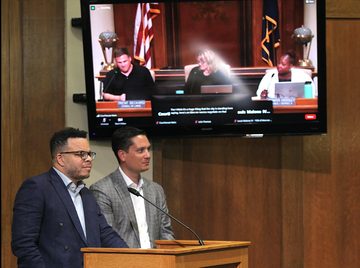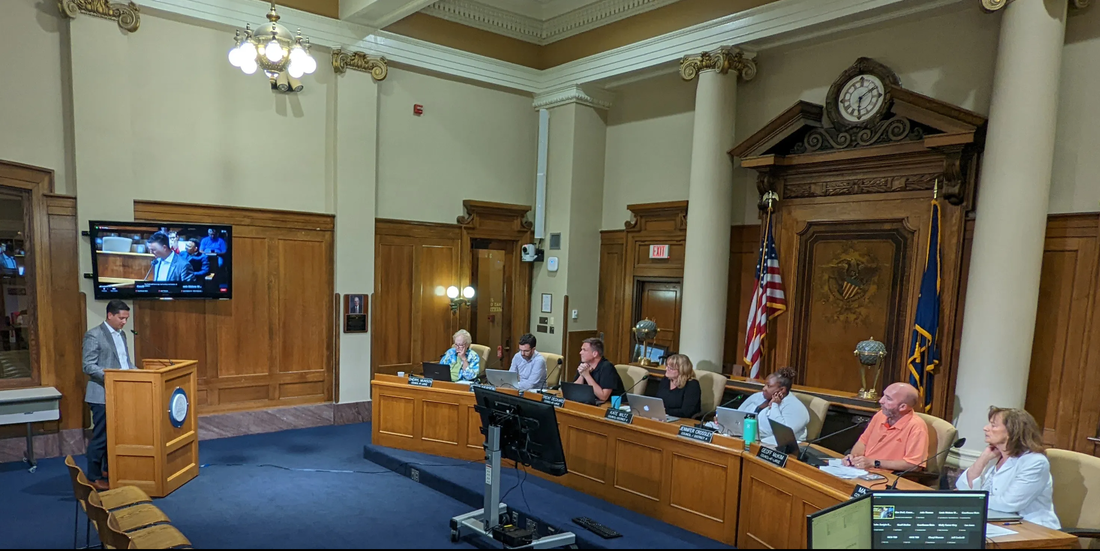|
NOTE: This article that highlights President & CEO, Eric Spoonmore's, involvement was published in the August 10, 2022 B Square Bulletin by Dave Askins. Photos are gathered from the article as well. While a lot of details remain to be worked out, Monroe County councilors appear receptive to the basic idea of transferring ownership of the county’s convention center and related properties to the city of Bloomington. The city’s hoped-for timeline for getting the deal done is the end of September. At their regular meeting on Tuesday, county councilors took turns responding to a pitch from Greater Bloomington Chamber of Commerce Eric Spoonmore, who is their former colleague, and Bloomington deputy mayor Don Griffin. The two gave a somewhat longer version of the proposal that county commissioners had heard during public commentary at their regular meeting last Wednesday. The city’s pitch comes in the context of some political pressure to use the food and beverage tax, enacted in 2017 by the county council, for its lawful purpose—to expand the convention center. The hoped-for collaboration between the city and the county on a joint effort at expansion was stalled even before the COVID-19 pandemic hit. One fear is that the state legislature will sunset food and beverage taxes in its 2023 session, which could be somewhat countered by action now to get the food and beverage tax revenues obligated through a bond issuance.  From left: Bloomington deputy mayor Don Griffin and Greater Bloomington Chamber president Eric Spoonmore address the Monroe County Council (Aug. 9, 2022) From left: Bloomington deputy mayor Don Griffin and Greater Bloomington Chamber president Eric Spoonmore address the Monroe County Council (Aug. 9, 2022) Councilor Geoff McKim noted that he’s one of the two county councilors still serving who voted for the food and beverage tax. The other is Cheryl Munson. About his vote in support of the tax, McKim said, “I’d do it again.” He added, “We do need to move forward, and we need to move forward now.” McKim wrapped up his basic position by saying, “This proposal is a good start to a real path forward.” The group that will need to be convinced to make the transfer of property is the county board of commissioners, who have yet to weigh in, but appear skeptical at this point. On Tuesday, councilor Marty Hawk said the county’s legal department should not invest time working on the deal if the commissioners are not going to go forward, “because that costs taxpayer money.” The big difference between last week’s pitch to county commissioners and this week’s presentation to the county councilors was the inclusion of some possible terms for negotiation. Griffin framed the proposal as something that is not a purchase: “This is not a real estate sale, but a transfer and trade of assets.” One key point of the deal would be the payment of the outstanding debt on the convention center by the city, which is around $2.2 million, according to convention and visitors commission (CVC) chair Mike Campbell. He serves on the CVC as associate director of Indiana Memorial Union. Griffin said on Tuesday the debt payoff would be made by the city using funds other than the innkeeper’s tax. The city wants to see a portion of the innkeeper’s tax receipts continue to flow to support the operation of the convention center under the city’s stewardship. How big that portion would be could be the subject of negotiation, Griffin said on Tuesday. Beyond the convention center itself, it’s not yet clear what real estate would be a part of the deal. Under the proposal, the city would pay the county only for land that was acquired with money other than the innkeeper’s tax. Real estate that has been purchased with innkeeper’s tax money to support the planned expansion of the convention center would just be transferred to the city. On Tuesday, councilor Cheryl Munson asked that the specific properties that are under consideration eventually be identified. Some other parts of the proposed deal don’t appear to have a specific nexus with the convention center. Under the terms, Bloomington would transfer to the county health department the city’s share of the statewide opioid settlement, which amounts to a total of about $1.9 million. Under a separate item on the term sheet, Bloomington would agree to operate public bus service outside city limits to Ivy Tech, charging the county the actual extra cost to provide the service. Councilor Peter Iversen said those two items reflect the shared community values of public transportation and fighting opioid addiction. Running buses outside the city limits to serve Ivy Tech has long been a topic of conversation. The legal questions that need to be answered are supposed to be included as part of Bloomington Transit’s strategic plan, that is currently being developed. The roughly $1.9 million that Bloomington anticipates receiving from the opioid settlements are supposed to be paid out by drug companies over a period of 18 years. In addition, 70 percent of the local government settlement share has to be used for treatment, prevention, and care. Included on Tuesday in Bloomington’s pitch was the idea that an expanded convention center could help counter sentiment outside the state for divestment in Indiana, caused by the recent enactment of SB1, which is legislation that prohibits most abortions. It’s not clear what, if any, impact SB1 might have on attracting out-of-state convention center business. Indiana governor Eric Holcomb signed SB1 into law four days ago, on Aug. 5. In his remarks to the county council, deputy mayor Don Griffin said, “We also recognize the devastating effects of the recently passed SB1 by the General Assembly on Hoosier women.” Griffin continued, “Rather than encouraging divestment from Indiana, we should encourage investment in Bloomington, a community with forward-thinking values, creating more space to meet, utilizing our opportunity to be a beacon to other communities.” Councilor Jennifer Crossley responded to Griffin’s idea by saying, “I do think that it would be great to have our community be the highlight of the state.” She added, “It would be really great to use this as a moment in which we can say: Here’s another thing that we can add to the list that comes with Bloomington and Monroe County.” Local opposition to SB1 has already had an impact on the choice of guests for Greater Bloomington Chamber of Commerce events. On Tuesday morning, (Aug. 9) lieutenant governor Suzanne Crouch was supposed to address the Bloomington Women in Leadership. The local chapter of NOW as well as the Monroe Democratic Party called on the chamber to cancel the event, saying that having Crouch address the group was “a slap in the face of all Hoosier women.” A few hours later the chamber announced that the event had been “postponed” until a future date to be determined. Responding to the chamber’s announcement, organizers of the opposition to Crouch’s appearance issued a statement that included a look forward at the economic impact of SB1: “We hope…the Chamber will consider holding an event discussing the challenges SB1 will bring to the economic vitality of our community and state that is truly empowering to women.” A big part of Bloomington’s pitch for taking over the management of the convention center also includes the idea that the convention industry is still strong, even in the context of the COVID-19 pandemic. A point of emphasis for speakers at last week’s meeting of the county commissioners was the idea that convention center business is coming back back, after sagging during the height of the COVID-19 pandemic. Kirby Brown, who’s general manager at Aimbridge Hospitality which operates SpringHill Suites by Marriott in downtown Bloomington, told commissioners that Marriott is in a lot of different markets and offered a conclusion from that perspective: “The resounding thought process right now is: in-person is back.” Brown added, “The demand for in-person meetings and convention-style meetings is not going to go away, like we had feared when the pandemic first rolled out.” Talisha Coppock, who’s executive director of the Monroe County Convention Center and Downtown Bloomington, Inc., told commissioners that current local business and conference business is back to 2018 levels. She added that the schedule looks strong for next year. According to Coppock, people really want to see each other: “We’re starting to see the hybrid stuff really kind of go away,” she said. As the months go on, Coppock said, people are wanting to “get back at it.” At a late June meeting of the convention and visitors commission, Coppock reported 10 lost event bookings—just due to the limited capacity of the current convention center. Given the friction between county commissioners and Bloomington mayor John Hamilton, which is reflected in the stalling out of the joint effort to expand the convention center, one theoretical option would be for the city of Bloomington to build its own, bigger convention center. Iversen appeared to be speaking in opposition to that idea when he said, “ I think it is in my constituents’ interest that this community have one convention center. And that is the underlying approach that I’m going to be taking here, is doing what we can to have one convention center.” County council president Kate Wiltz alluded to the possibility that the city might build its own convention center, “I feel pretty strongly that there’s a reason we’ve collected this money, and we can’t just sit on it no matter what the risks are of sunset, or of two convention centers, Bloomington and Monroe County—for crying out loud, that would be ridiculous.” Responding to a B Square question after the presentation to the county council, Griffin rejected the idea that building its own convention center might be the city’s backup position. His first job as deputy mayor is to bring the community together, Griffin said. He called the idea of two convention centers a “scorched earth” approach.
1 Comment
5/30/2023 08:00:09 am
Thanks for your post.
Reply
Leave a Reply. |
Chamber NewsThis blog contains press releases, other news updates from the Chamber, news articles and radio interviews featuring interviews with the Chamber and team members, and much more! Categories
Categories
All
Archives
Archives
July 2024
|
|
Copyright The Greater Bloomington Chamber of Commerce. All Rights Reserved.



 RSS Feed
RSS Feed
